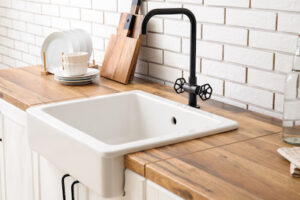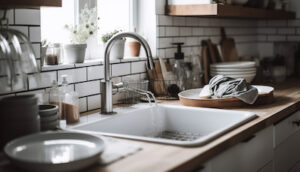Farmhouse Sinks: DIY Installation Guide with The Pros and Cons
Farmhouse sinks are all the rage in modern home decor, especially for kitchens with a farmhouse style. Their rustic charm has stolen the hearts of many homeowners. But what’s the secret behind their popularity? It’s not just about their good looks – the materials they’re made from play a big part, too.
In this article, we’ll closely examine what makes farmhouse sinks special. We’ll talk about their advantages and some things to consider. Whether you’re dreaming of a kitchen makeover or just curious about design, come along as we explore the pros and cons of having a farmhouse sink in your home.

Materials and Durability
Farmhouse kitchen sinks, often crafted from cast iron, are built tough to resist chipping and handle daily use like a champ. But there’s more to the story than just durability. Let’s dive into their history and discover why they’re so popular today.
Facts on Durability
- No More Chipping: Cast iron sinks are designed to stay free from chips, even if you use them daily.
- Strong and Sturdy: These sinks are heavy and solid, standing up to all the action in your kitchen without breaking a sweat.
- Heat Lover: Hot water is no problem for these sinks – they can take the heat without damage, making them last longer.
- Stay Nice and Smooth: The sleek surface of cast iron sinks holds up well, staying good-looking for a long time.
- Less Noise, Less Trouble: Because of their thickness, these sinks are quieter and less likely to get damaged if something falls in.
Farmhouse Sinks DIY Installation Guide
Choosing the Right Sink
Selecting the perfect farmhouse sink is crucial. Factors like size, material, and style should align with your kitchen or bathroom’s decor. Ensure the sink complements your space seamlessly.
Tools and Materials
Before diving into installation, gather the necessary tools and materials, including a farmhouse sink, faucet, silicone sealant, brackets, screws, and a jigsaw. Having everything at your disposal will make the process smoother.
Preparing Your Cabinet
Ensure your cabinet can support the weight of the sink. Reinforce it if necessary. Measure and mark the cabinet to create a template for cutting an opening for the sink.
Cutting the Countertop
Carefully cut the countertop following your template. Be precise, as this will determine the sink’s fit. Wear safety goggles and gloves for protection.
Installing the Sink
Place the sink into the opening and secure it with brackets and screws. Apply silicone sealant around the edges to prevent water leakage. Ensure the sink is level and securely attached.
Connecting the Plumbing
Connect the plumbing fixtures, including the faucet and drainage system, to the sink. Check for any leaks and make necessary adjustments.
The Variety of Farmhouse Sinks
There’s a whole bunch of different types of farmhouse sinks, each with its own style and features. But how can you figure out which one is the best for you? Making a smart choice means understanding what’s good and not-so-good about each type.
Styles in Numbers
- Lots of Looks: Farmhouse sinks come in tons of styles, like classic, modern, and rustic, so you can find one that matches your kitchen’s vibe.
- Different Materials: You can pick from different materials like porcelain, stainless steel, and cast iron, depending on how they look and work.
- Sizes for All: Farmhouse sinks come in various sizes to fit all kinds of kitchens.
- Custom Creations: Some sinks can be customized – you get to choose things like color, size, and extras to match your style.
Different Types of Farmhouse Sinks
Farmhouse sinks come in all sorts of types, each with its own cool design and features.
- Classic Farmhouse Sinks: These sinks have a timeless charm with a deep basin. They’re made from materials like cast iron, composite, or fireclay. The front apron that’s out in the open and the curved corners bring an old-world touch. You can find them in different sizes to suit your space.
- Apron Front Sinks: These modern sinks have clean lines and a simple apron front. The single bowl inside is roomy and spacious. They often use stainless steel for a shiny, sturdy look. Some even use copper for a natural, rustic style.
- Double Bowl Farmhouse Sinks: These sinks have two bowls, which means you have more space for different tasks. You can soak dishes on one side while you wash on the other. Stainless steel is a great choice for these sinks.
- Luxury Bronze Farmhouse Sinks: If you’re looking for a touch of elegance, bronze sinks are the way to go. They have an antique copper finish that develops character over time. Combined with their vintage style, they bring a touch of old-world charm to any kitchen.
Farmhouse Sinks: The Pros and Cons of Installing It
Like anything else, weighing the pros and cons is important when thinking about installing a farmhouse sink in your kitchen. Here is a list of pros and cons:
Pros
- Awesome Vintage Design: The vintage look and exposed front add charm and character to your kitchen.
- Big Basin: The large, deep basin gives you plenty of room to wash big stuff.
- Built to Last: Farmhouse sinks made from materials like cast iron and stainless steel can handle lots of use.
- Holds the Heat: Enameled cast iron keeps things warm – great for filling big pots.
- Lots of Shapes: Whether you like rounded or squared corners, there’s a farmhouse sink shape that suits your style.
- Lots of Space: The generous sink holds water and stops splashes, leaving your counters dry.
- Room to Get Things Done: With lots of space, you can do different kitchen tasks without making a mess.
- Stay Neat and Tidy: Fewer splashes mean less cleaning – that’s less work for you.
- Looks Good, Works Well: Farmhouse sinks do their job and add style to your kitchen by keeping water where it belongs.
Cons
Getting a farmhouse sink might mean changing up your kitchen layout. But for those who are up for the challenge, there’s a wide variety of options to choose from. Farmhouse sinks come in classic designs and more modern ones, so there’s something for everyone.
- Costs More: Farmhouse sinks can be pricier to buy and put in than regular sinks.
- Changes to Consider: Installing a farmhouse sink might need changes to your kitchen’s layout. Some examples include:
- Adjusting the Height of Your Countertops
- Adjusting the Counters
- Cabinet Switch-Ups: The space under the sink might need adjustments to make room for its big front – a special part of farmhouse sinks.
- Plumbing Puzzles: Switching out a regular sink for a farmhouse sink can be tricky, and you might need to make changes to how water flows.
- Needs Care: These sinks need more care, like regular cleaning and sealing, to stay looking nice.
- Chipping Risk: The enamel on some sinks might chip if not taken care of.
- Cleaning Challenge: The exposed front needs more cleaning to keep it looking good.
Is a Farmhouse Sink Right for You?
Farmhouse sinks need more care than regular sinks and require special sealing to stop staining. However, their relaxed style and usefulness might be more important to many people. Like when you’re getting something important, folks often have questions. Let’s talk about some of the most common ones.
Right for You Numbers
- More Work Needed: Farmhouse sinks need more looking after than regular sinks. You have to seal them now and then to stop them from staining.
- Keep Stains Away: Sealing is like a shield that stops stains from sticking to the sink. This keeps it looking great for a long time.
- Clean More Often: Since they stick out in the front and are more extensive, farmhouse sinks might need more cleaning to stay looking super clean.
- Looks vs. Work: Think about how cool a farmhouse sink looks against how much work you need to put into keeping it cool. Make sure it matches what you like and how you live.

Frequently Asked Questions
What materials are most durable for farmhouse sinks?
Cast iron and fireclay are two of the most durable materials for farmhouse sinks. Their tough constitution prevents chipping, abrasion, and staining. Stainless steel is also an excellent option, combining durability with an affordable price point.
How does the installation process of a farmhouse sink differ from a traditional sink?
A farmhouse sink requires more customization and potential cabinet modifications to account for the sink’s larger size and weight. The sink needs additional support and may require alterations like raising the counter height and for this, we’d recommend professional help.
Are farmhouse sinks more maintenance-intensive than other sink types?
Yes, the prominent exposed front and large surface area require a bit more regular cleaning. Rinsing frequently prevents mineral deposits and soap scum buildup. Occasional sealing also helps protect the sink’s surface from stains.
Wrapping It Up
Farmhouse sinks have a fantastic vintage style, but they do need some extra attention when it comes to installation and care. If you’re willing to put in the effort, a farmhouse sink can become a fantastic and practical centerpiece in your kitchen. If the rustic look matches the look and feel of your home, it could be a wonderful addition. Just make sure to research your options well to find the perfect fit for your kitchen.
